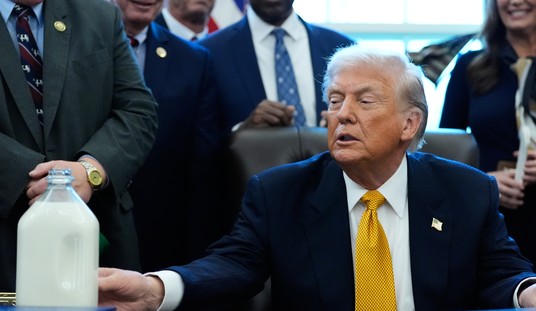Last night, a number of people on Twitter pointed out that Mitt Romney didn’t get a majority of the Florida primary vote and claimed that combining the percentages of all other competitors showed that he could still be stopped. I pointed out earlier that this assumes everyone wouldn’t vote for Romney as a second choice, which polling shows to be false (he was second among second choices in Florida), but let’s put that aside for a moment. To whom should conservatives look as the consolidation candidate? After watching Newt Gingrich lose two debates and suffer a steep reversal of fortunes in Florida, some look to Rick Santorum, such as Andrew Malcolm, who wonders if Gingrich has worn out his welcome:
In an amazingly graceless non-concession concession speech after not phoning the victor out of common competitive courtesy, Gingrich chose to talk not about minor matters such as how he proposes to win the Nov. 6 national general election against $1 billion.
No. Instead, Gingrich described in great detail what all he is already planning to do and sign during his first day in the Oval Office, in between taking the presidential oath and numerous inaugural parties.
Seriously.
After a humiliating defeat, Gingrich spoke of a two-man race, assuming his own GOP nomination and general election victories. Big ideas? Try loony ideas. The guy is living in a parallel universe.
Now, Gingrich takes his campaign to Nevada, the state with the most foreclosures in the nation, where he has three days to explain what he did for that $1.6 million that mortgage giant Freddie Mac paid him.
Jeffrey Anderson at The Weekly Standard looks at the numbers ahead:
In Missouri, where the next Republican primary will take place (next Tuesday), a new poll by PPP shows Rick Santorum leading Mitt Romney by 11 percentage points — 45 to 34 percent — while Ron Paul has 13 percent support. Newt Gingrich isn’t on the ballot in Missouri, so the Show Me State offers a prime opening for Santorum to build on his earlier victory in neighboring Iowa.
Perhaps even more encouraging for Santorum are the candidates’ respective favorability ratings among prospective primary voters in the state. Santorum’s net favorability rating is +42 percent (63 percent favorable to 21 percent unfavorable), compared to +10 percent for Romney (46 percent favorable to 36 percent unfavorable). (Paul’s net favorability rating is minus-29 percent — 28 percent favorable to 57 percent unfavorable.)
Those aren’t the only numbers that suggest that Santorum could stand up better to Romney than Gingrich. PPP polling in key upcoming states show that Santorum challenges Romney more strongly in Ohio as well as Missouri:
Rick Santorum is leading the way for next week’s ‘beauty contest’ primary in Missouri with 45% to 34% for Romney, and 13% for Ron Paul. Newt Gingrich is not on the ballot for that, but he will be in the picture for Missouri’s caucus and leads the way for that with 30% to 28% for Santorum, 24% for Romney, and 11% for Paul.
In Ohio Gingrich is at 26% to 25% for Romney, 22% for Santorum, and 11% for Paul.
What might be most interesting in both states is what happens in a head to head between Romney and either Gingrich or Santorum:
-In Missouri Santorum leads Romney 50-37 and in Ohio Santorum leads 45-38.
-In Missouri Gingrich leads Romney 43-42 and in Ohio Gingrich leads 42-39.
Two takeaways from those numbers: if this ever came down to Romney, Paul, and just one out of Gingrich and Santorum, Romney would be in a lot of trouble. And he’d be in more trouble if the single conservative alternative ended up being Santorum.
It’s not just the numbers, either. The debates in Florida last week showed that Gingrich’s claim to mastery of the format simply don’t hold up. He lost both of those debates, and spent the rest of the week attacking Romney on religious freedom and proposing a lunar base that would cost hundreds of billions of dollars in an era where Republicans are arguing for reduced spending. If Gingrich was actually making the conservative case against Romney, I could see Sarah Palin’s point, but he’s not. He’s making a case for “big ideas” that involve a huge amount of spending, attacking Romney on any basis that happens to be handy, and he’s attacking the media.
The candidate actually making the conservative case on the campaign trail is Rick Santorum. Santorum scored points off of Romney in both Florida debates, especially the last one, because Santorum hasn’t ever backed an individual mandate as a health-care solution and doesn’t have to defend that position. He’s never backed TARP, either. That doesn’t make Santorum a perfect conservative candidate, but he seems to be the only one who’s focusing on the actual conservative agenda. Even if the motivation is to back a conservative alternative to Romney to “sharpen his steel” and force him to follow the conservative agenda, it’s Santorum who is most effective at making that the agenda.
Plus, there is one more thing to consider, and that is the quality of leadership. Both of the frontrunners and their allies have engaged in disappointing attacks on free market enterprise in an attempt to exploit each others’ weaknesses, but Santorum has refrained from doing so, even though he has specifically targeted blue-collar voters who might respond to those attacks. Santorum has maintained a high level of integrity in his campaigning, and that’s something to consider when choosing the man who will represent the party in the 2012 elections.
Santorum also has a new ad out today, “Deal,” which targets Gingrich. It’s running in Nevada and Colorado this week:







Join the conversation as a VIP Member